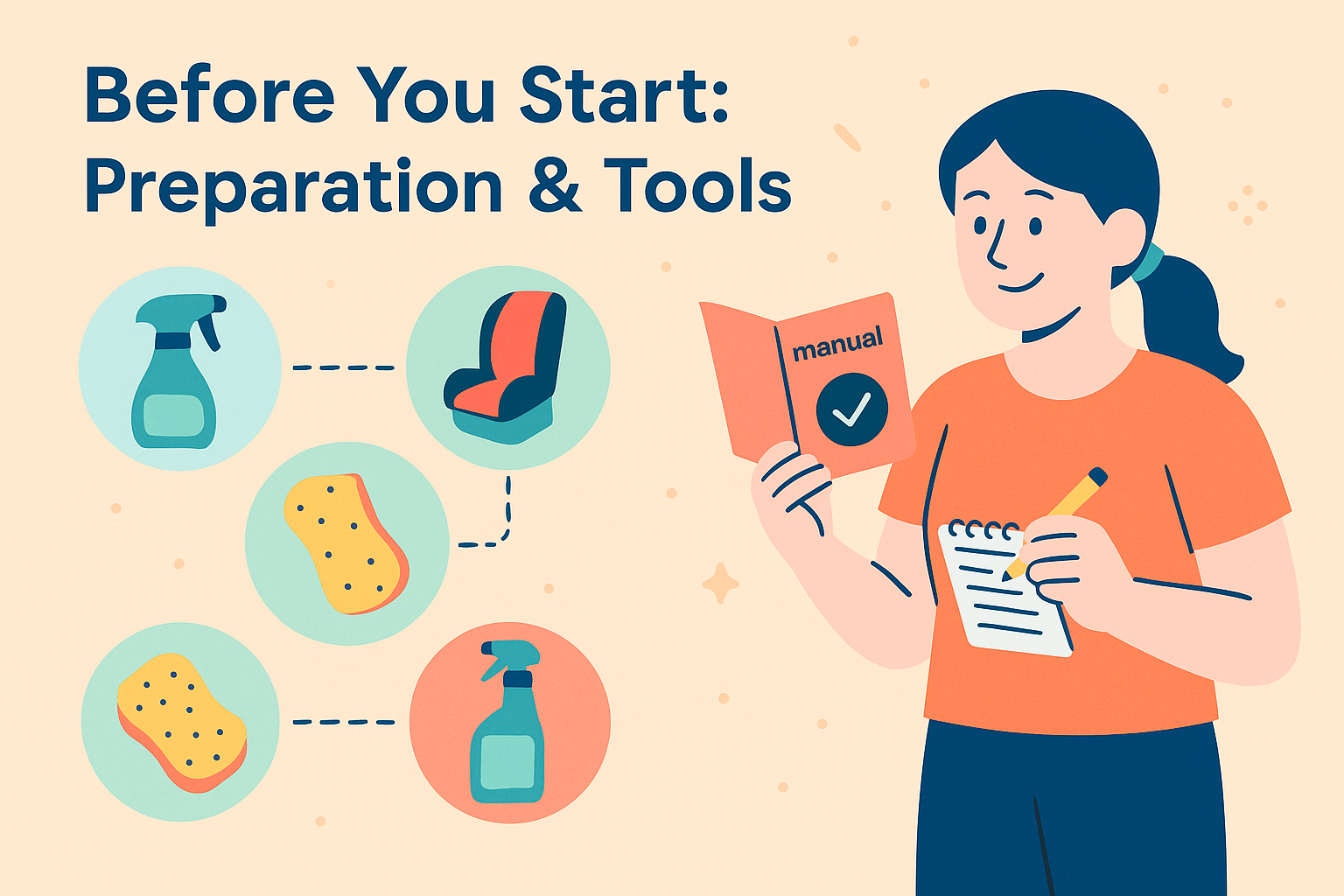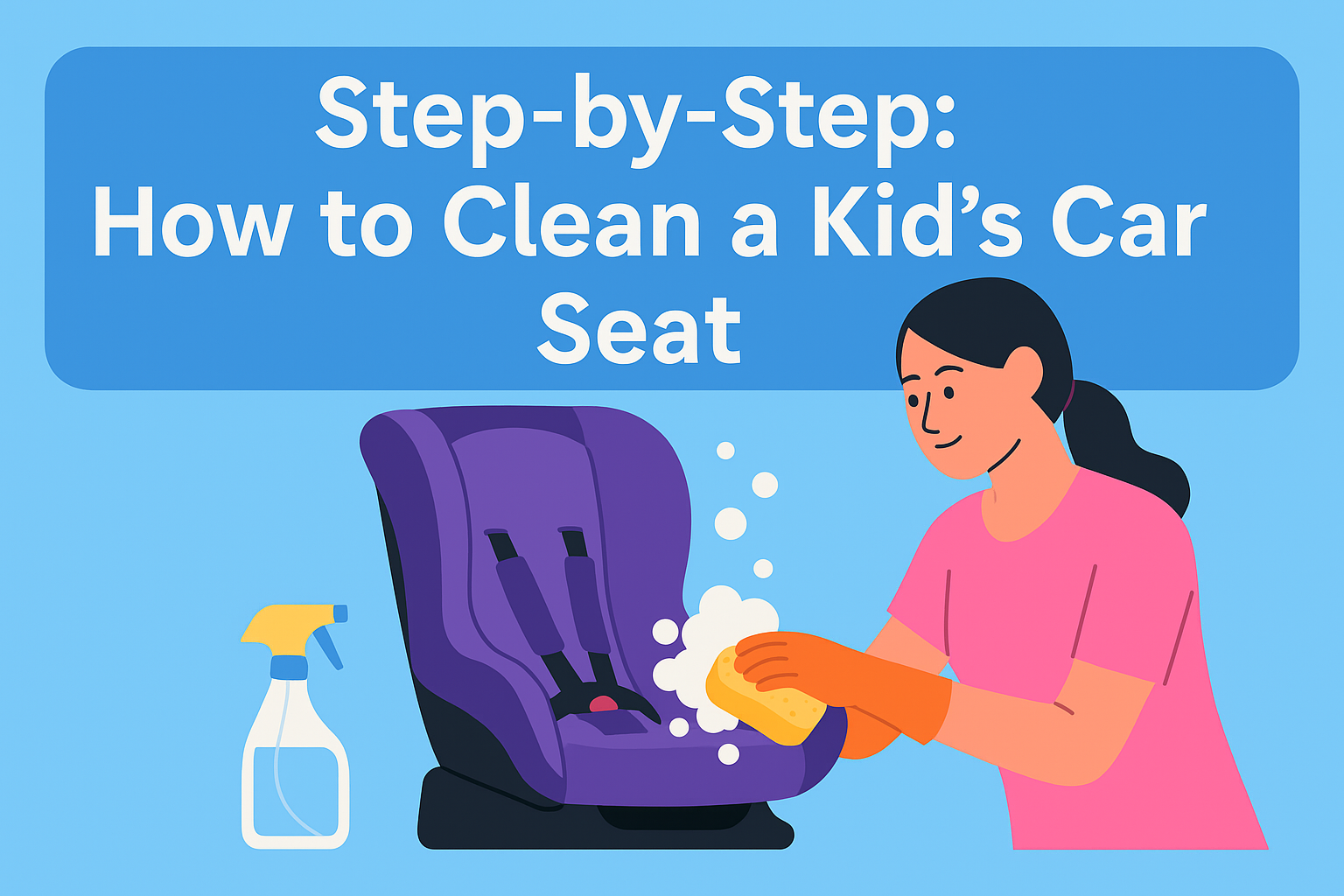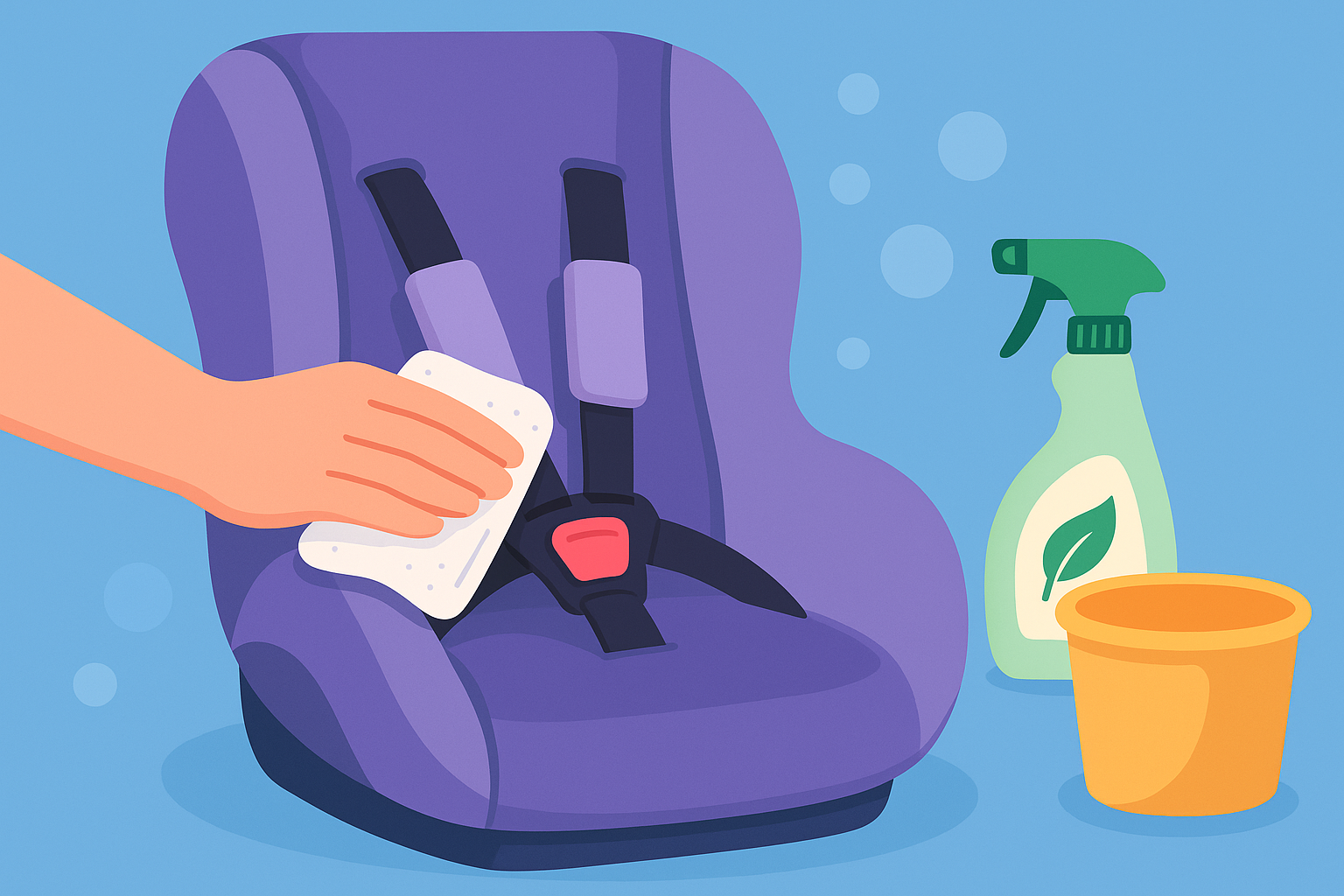How to Clean a Kid’s Car Seat Safely & Easily (Step-by-Step 2025)
A kid’s car seat isn’t just a piece of baby gear—it’s one of the most critical safety devices you own. Many parents think cleaning a car seat is all about removing crumbs or wiping off spills. But did you know that cleaning it incorrectly can make it unsafe for your child? Learning how to clean a kid’s car seat properly means your little one will travel both comfortably and securely.
Importance of Car Seat Hygiene
Kids can be messy, and car seats often end up full of food crumbs, sticky drinks, and everything in between. Keeping the seat clean is important for hygiene and can help prevent germs and odors from building up. A clean seat is simply a healthier place for your child.
How Improper Cleaning Can Affect Safety
Some cleaning mistakes are more serious than others. For example, using harsh chemicals or soaking the straps can damage the materials. If the harness or padding gets weak, it may not protect your child in an accident. That’s why every parent should know how to clean a kid’s car seat safely.
Common Mistakes Parents Make
-
Throwing covers in the washing machine without checking the manual
-
Using bleach or strong cleaners that break down fabric
-
Forgetting to check if everything is reassembled correctly
-
Drying parts in the sun, which can weaken plastic and fabrics
Eco-Friendly Cleaning Benefits
Cleaning your kid’s car seat doesn’t have to harm the planet. Choosing eco-friendly cleaning methods means fewer chemicals, less waste, and a safer world for your child. Plus, many green cleaning solutions are gentle on both the seat and your little one’s sensitive skin.
Table: Why Clean Your Kid’s Car Seat?
| Reason | Details |
|---|---|
| Health & Hygiene | Removes germs, allergens, and odors |
| Safety | Keeps harness and seat parts functioning as designed |
| Comfort | Prevents sticky, uncomfortable messes |
| Longevity | Maintains material quality, extends seat’s life |
| Eco-Friendly | Less waste and safer cleaning for your family & the planet |

Before You Start: Preparation & Tools
Getting ready is the first step in learning how to clean a kid’s car seat like a pro. The right prep and tools will make the job safer and easier!
Reading the Manufacturer’s Manual
Always begin by checking the car seat manual. Different seats have different cleaning rules. The manual will tell you which parts can be washed, which need spot cleaning, and how to take things apart. If you don’t have the manual, look it up on the manufacturer’s website.
What Cleaning Tools & Products to Use
Gather all your supplies before you begin. You’ll need:
-
A soft cloth or sponge
-
Mild, baby-safe soap
-
A small vacuum or handheld brush
-
Spray bottle with water or diluted vinegar
-
Eco-friendly cleaning spray (optional)
-
Towel for drying
Eco-Friendly vs. Chemical Options
It’s best to avoid harsh chemicals. Instead, use natural, eco-friendly products like plant-based soap, white vinegar (diluted), or baking soda for stains. These are safer for your child and the car seat’s materials.
Safety Precautions Before Cleaning
-
Wash your hands before and after
-
Work in a well-ventilated space
-
Keep all cleaning products away from children
-
Take photos of the car seat before taking it apart—this helps with reassembly!
Table: Must-Have Car Seat Cleaning Supplies
| Tool/Product | Why You Need It |
|---|---|
| Soft Cloth/Sponge | For gentle cleaning of fabric & plastic |
| Mild Baby Soap | Safe for babies, won’t harm materials |
| Handheld Vacuum/Brush | Removes crumbs from crevices |
| Diluted Vinegar Spray | Natural deodorizer, kills some bacteria |
| Towel | For drying parts |
| Eco-Cleaning Spray (optional) | Plant-based, non-toxic cleaning option |

Step-by-Step: How to Clean a Kid’s Car Seat
Now, let’s dive into how to clean a kid’s car seat from top to bottom. Don’t worry—just take it one step at a time!
Removing & Inspecting the Car Seat Cover
Carefully remove the car seat from the car and bring it to a clean work area. Unfasten the seat cover, buckles, and any removable padding. Check for crumbs, hidden messes, or signs of wear. Snap a few photos to help you remember where each piece goes.
Vacuuming & Surface Crumb Removal
Use a handheld vacuum or brush to get all the crumbs and dirt out of cracks and crevices. Pay extra attention to cup holders, corners, and under the padding. This makes the rest of the cleaning much easier.
Cleaning Stains Safely
Dab a soft cloth or sponge in mild, soapy water (or diluted vinegar). Gently clean any sticky spots or stains—never soak the fabric or straps. For tougher spots, use a small amount of baking soda mixed with water, then wipe with a clean, damp cloth.
Drying & Reassembly Tips
After cleaning, pat all fabric and straps dry with a towel. Let them air-dry completely before putting everything back together. Use your photos or the manual to reassemble the seat carefully, double-checking all buckles and straps.
Table: Car Seat Cleaning Steps (Quick View)
| Step | What to Do |
|---|---|
| Remove Cover & Padding | Take off fabric parts, check for messes |
| Vacuum & Brush | Clean crumbs from cracks and crevices |
| Spot Clean | Use mild soap and water on stains |
| Rinse & Dry | Wipe away soap, let everything air dry fully |
| Reassemble | Put all pieces back, checking every attachment |

How to Clean Straps, Buckles & Harness Properly
One of the most important parts of cleaning a kid’s car seat is caring for the straps and buckles—the safety features that protect your child every ride.
Why Straps Require Special Care
Car seat straps (the harness) are made from strong webbing that can be damaged by bleach, strong soap, or scrubbing. Never put harness straps in a washing machine or soak them in water.
Safe Ways to Clean Harnesses
Dampen a soft cloth with mild soap and water. Gently wipe the straps, focusing on sticky or dirty spots. Don’t rub too hard—this can wear down the fibers. Wipe again with a clean, damp cloth to remove any soap.
Buckle & Clip Cleaning Methods
For buckles, use a damp cloth to wipe away any spills or crumbs. If a buckle is sticky, check the manual—some brands allow rinsing with water, but others do not. Never use oil or lubricant on buckles.
What NOT to Do (Avoiding Damage)
-
Do not use bleach, ammonia, or abrasive cleaners
-
Never submerge straps or buckles in water
-
Do not use a dryer or leave straps in direct sunlight
-
Don’t reassemble if any parts are still damp
Table: Harness & Buckle Cleaning Do’s and Don’ts
| Do | Don’t |
|---|---|
| Use mild soap & water | Use bleach or harsh chemicals |
| Wipe with a damp cloth | Soak or submerge in water |
| Air-dry completely before reassembling | Use hair dryer or direct sunlight |
| Check manual for instructions | Ignore manufacturer guidelines |
Zero Waste & Eco-Friendly Cleaning Tips
Parents who care about both their child’s health and the planet love eco-friendly cleaning options! Here’s how to clean a kid’s car seat without waste or toxins.
Homemade Natural Cleaning Solutions
-
Baking Soda Paste: Mix baking soda and water for a gentle scrub
-
Diluted White Vinegar: Use 1 part vinegar, 2 parts water for deodorizing
-
Castile Soap Solution: Plant-based, gentle, and baby-safe
Best Eco-Friendly Cleaning Products
Look for cleaners labeled non-toxic, biodegradable, and fragrance-free. Some top picks include Dr. Bronner’s, Attitude, and Ecover. Always check they’re safe for fabrics and for babies.
Reducing Waste During Cleaning
Use reusable cloths instead of paper towels. Choose washable cleaning pads and a small, efficient vacuum.
Sustainable Storage & Maintenance
Keep your kid’s car seat covered with a washable cloth when not in use. Regular quick cleanings prevent big messes and lengthen the life of your car seat.
Table: Top Eco-Friendly Car Seat Cleaning Tips
| Tip | Eco Benefit |
|---|---|
| Use homemade cleaners | Reduces plastic waste, fewer chemicals |
| Choose reusable cloths | Less single-use paper, saves money |
| Air dry in shade | No electricity needed, protects fabrics |
| Regular maintenance | Fewer deep cleans needed, longer product lifespan |
FAQs: Kid’s Car Seat Cleaning
How often should I clean my kid’s car seat?
Spot clean as needed, especially after spills. Do a thorough cleaning every 1-2 months, or if you notice smells, stains, or sticky messes.
Can I use vinegar or baking soda to clean the car seat?
Yes! Diluted vinegar and baking soda are safe and eco-friendly for most car seat fabrics—but always check your seat’s manual to be sure.
What if the straps get wet?
Pat them dry with a towel and let them air dry completely. Never use a heater or dryer. Damp straps should never be reassembled.
When should I replace a car seat?
If you see any fraying, stiffness, broken buckles, or after a car accident, replace the car seat. Also, if the seat is past its expiration date or if you notice the harness isn’t working as intended.
Is it safe to machine wash the car seat cover?
Only if your car seat manual says it’s OK! Some covers can go in the machine on a gentle cycle, others can’t. Always air dry—never put covers in the dryer.
What should I do if I can’t get all the stains out?
Tough stains may need several gentle cleanings. Avoid strong chemicals. Sometimes, a slightly stained but structurally safe seat is better than one damaged by cleaning.
Table: FAQ Quick Answers
| Question | Short Answer |
|---|---|
| How often to clean? | Spot clean as needed, deep clean every 1-2 months |
| Use vinegar or baking soda? | Yes, if manual allows |
| Straps got wet? | Air dry fully, don’t use heat |
| When to replace car seat? | After damage, expiration, or an accident |
| Machine wash cover? | Only if manual allows, never tumble dry |

Conclusion: Keeping Your Child Safe, Clean & Happy
Cleaning your kid’s car seat isn’t just about looks—it’s about safety, health, and peace of mind. By learning how to clean a kid’s car seat safely and easily, you protect your child from germs and help your car seat last for years.
Remember these key steps:
-
Always check the manual before cleaning
-
Use mild, eco-friendly products
-
Take care when cleaning straps and buckles
-
Dry everything completely before reassembly
-
Regular maintenance makes big cleanings easier
Staying on top of car seat hygiene is one of the simplest ways to keep your child both safe and happy. Plus, using eco-friendly methods protects the planet they’ll inherit!
Share this content:













Post Comment